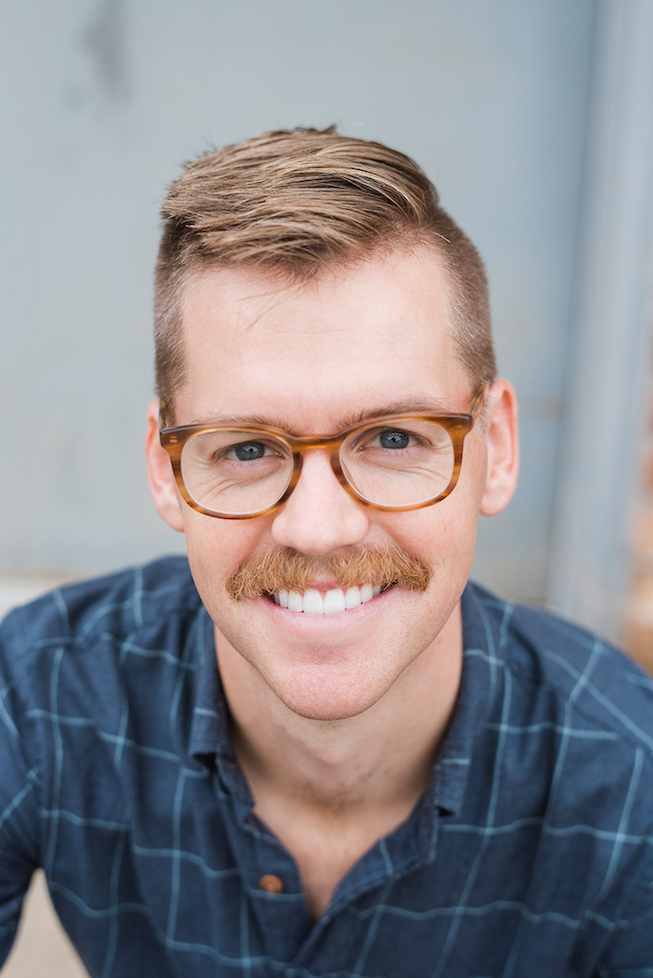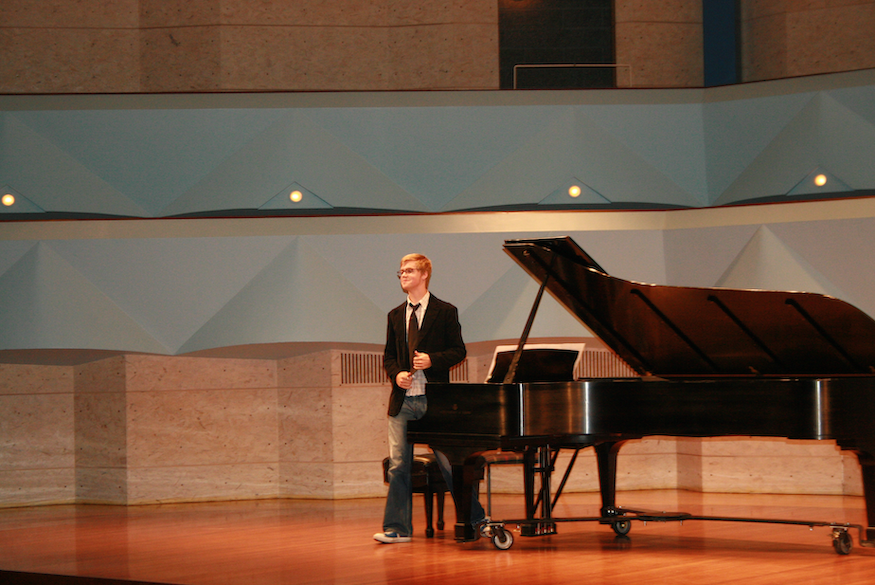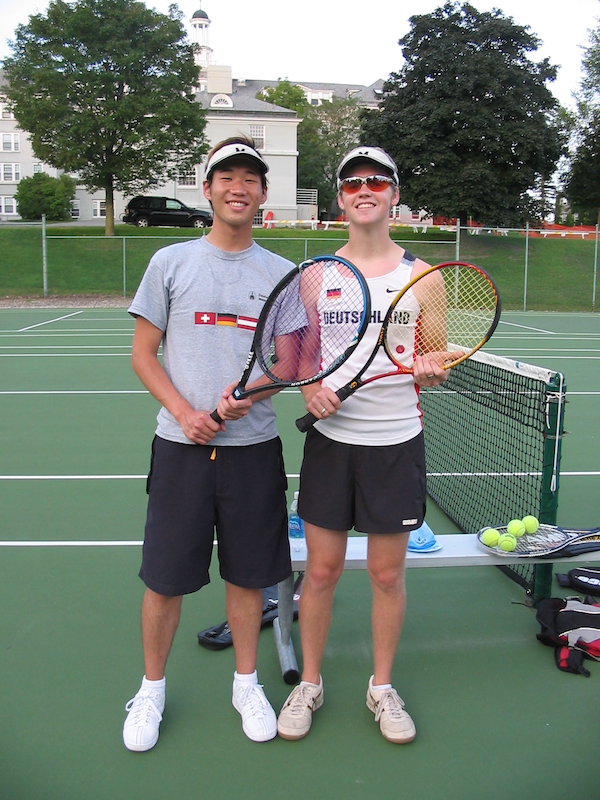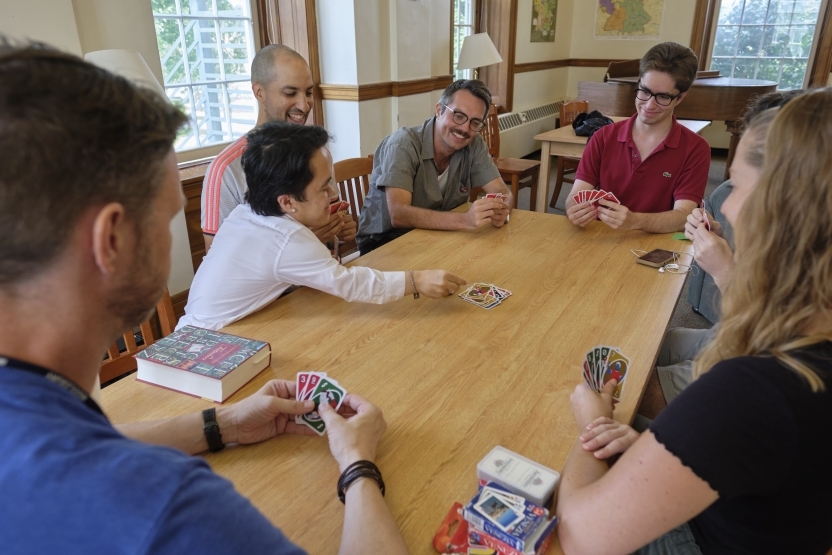The Mysterious Alchemy of the "Zauberberg": Tyler Carrington, Ph.D.
| by Tyler Carrington

Tyler Carrington, Ph.D., German School 2006, reflects upon his experience at the Middlebury Language Schools.
It might be a truism that people are what make educational experiences great and memorable, but if you’ll allow me a few observations about the people I met in Middlebury’s German School, I think there is a significant point to be made here about why the Language Schools are so unique and life-changing.
I frankly felt a little intimidated when I arrived in Middlebury.
The year was 2006, and I had just finished a BA in German two months prior. I recall thinking that many of my new classmates–some of whom, I soon learned, were working (semi-) professionally as translators and/or interpreters–were lightyears ahead of me, and I did my best to keep up and limit my mistakes.
Now, almost two decades later, I am a college German professor, and the skill that my best students all share is an adventurousness–indeed, a fearlessness–in language learning. Whether when chatting with me, native speakers, or other, more advanced students, they seem to realize that making, not avoiding, mistakes is critical to improving, and they find fun in that endeavor.
Thankfully, the Middlebury Language Schools were structured around two important principles that helped me push past that initial feeling of intimidation. First, and what Middlebury is famous for, was of course the Language Pledge®. This is great in its own right, but I might observe that other language programs have attempted similar things with less stellar results. My own efforts to create German-only environments haven’t been particularly successful, actually.

The second principle is people, or more specifically finding and matriculating students who are curious about language, driven to improve their skills, and eager to exchange tips and give explanations to one another…all in pursuit of better communication in the target language. Without such people, a language pledge can be a burden, a sort of artificial yoke that may limit English usage but isn’t necessarily transformational vis-a-vis the target language. With great people, the pledge is–as cheesy as it sounds to phrase it this way–an invitation to explore, to communicate, to have fun.
And here’s where I come back to the people…more specifically, two remarkable fellow students from that summer of 2006.
The first was one of those semi-professional translators and language wizards who intimidated me at first: Elias. Elias spoke something like 7 or 8 languages, most of them better than I did German; but we became fast friends and delighted in grammatical oddities of German and even debating (I was usually wrong) the gender of this or that obscure noun based on certain shorthand memory aids and etymological clues and so on. I recall Elias pulling out a great but ridiculously obscure exception to my somewhat simplistic observation that most (at the time, I probably asserted all, and with great confidence) nouns ending in “-is” are neuter, or “das” nouns. “Ah, but you’ve forgotten about ‘die Bronchitis!,” Elias exclaimed (in German, of course) on our way to what might even have been the first day of class. He had me there. And though I’ve never contracted bronchitis, I also never forgot that it is a feminine noun in German. Elias and I continued this at times obsessive interest in German grammar and usage for the six weeks and the year in Germany that followed, and I owe the enormous improvement of my skills in no small part to him.
The second student was Jimmy, who I think was not yet in the MA program back then but rather a returning immersion student at level 4, which was the last step before the MA program. But we also became great friends, bonding I think not over language intricacies but our shared love of both music and tennis.
German has a lovely verb for making music together–musizieren–and Jimmy and I spent much free time in the music building singing Brahms’s Die Mainacht and various Schubert Lieder. Jimmy encouraged me to perform a Brahms Intermezzo for solo piano at the summer’s music concert, which I did (wearing a handsome black blazer he lent me).

We also entered the German school’s tennis championship, the Midd-Open, as something of a rag-tag duo (he, the much better singles player; I, a raw but promising doubles player thanks to my application of my rather considerable badminton skills to my net game in tennis). We capped off an exciting tournament with a victory over the program’s inimitable erstwhile director, Dr. Jochen Richter, and have delighted ever since in our Midd-Open championship (regrettably, I’ve misplaced the championship khaki visor we were each awarded).

These musical and athletic avocations were central to making that summer a special time, but I want to linger for a moment on my friendship with Jimmy, for it was with him in mind that I conceived of this essay. After that summer in Middlebury, I went to Mainz and Jimmy to Hamburg (he on a Fulbright English Teaching Assistantship), and we never seemed to bridge the few hundred kilometer gap between those two cities to continue our bonhomie from that summer. After I returned home to the Midwest and was about to start another MA, I got a call from Jimmy. I didn’t recognize the number (I’m not sure I even had caller ID), but the voice on the other line opened with a tentative but familiar: “Hier ist Jimmy” (“It’s Jimmy”). Our conversation took off, and we had much to recount. But it’s remarkable to me in retrospect that it never occurred to either of us to speak in English, even though we are both native English speakers and were long since released from the shackles of our language oath. We met in German, and this is simply how we knew each other. Anything else would have felt, paradoxically, artificial. Since then, 2007, Jimmy and I have continued our telephone conversations at regular intervals, always and without exception in German, and we’ve even found opportunities to play (German) tennis and musizieren over the years. I don’t see how or why we would ever switch to English.
The red thread here is the combination of the unique setting the Middlebury Language Schools create and inhabit and the adventurous and fearless and delightfully interesting people they attract.
In the summer of 2006, that alchemy worked wonders for me and, I have to think, for everyone involved. I’ve often told my own students that my German improved more in the six weeks in Vermont than in multiple years spent studying, doing research, and vacationing in German-speaking Europe afterwards. And I think it is because of the people who come to Middlebury to be adventurous and delight in full and creative immersion.
Tyler Carrington is an Associate Professor of German Studies and History at Cornell College. He is the author of Love at Last Sight: Dating, Intimacy, and Risk in Turn-of-the-Century Berlin (Oxford University Press, 2019) and an avid musician, playing drums and keyboards with James Tutson and recently releasing two of his own solo albums of instrumental funk.
Founded in 1915 as the first of the Language Schools, the magic mountain, or, as German School students affectionately call it, the “Zauberberg,” has decades of experience in helping students achieve true fluency in German language and culture, whether they are undergraduates, graduate students, professionals, or life-long learners of all ages.

Gather your materials. Applications for the Summer 2025 sessions of our graduate, immersion, and German for Singers programs open on November 1!
